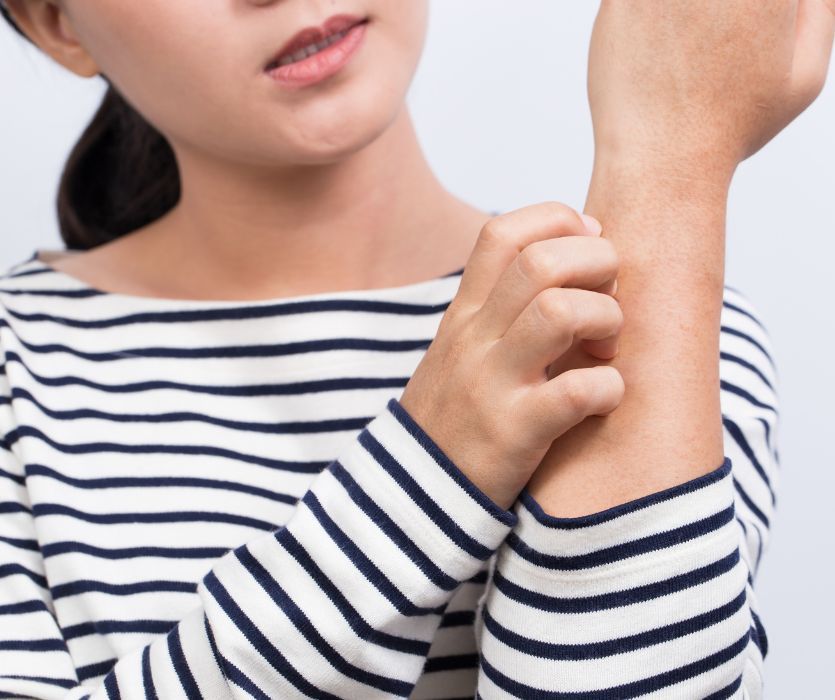Pregnancy comes with a litany of aches, pains, and minor complications. Usually, these are annoyances that come and go, but rarely become anything serious.
Most of us have heard of preeclampsia and have put that at the top of our “oh shit” list. Unless you’re an anxious hypochondriac with a Google problem, like me, you may not have heard of Cholestasis.
It is technically called Intrahepatic Cholestasis of Pregnancy but more often referred to as simply Cholestasis, or ICP.
ICP is a group of liver disorders that can rear their ugly heads during pregnancy. It most commonly makes its appearance in the third trimester, and like a lot of the shit we put up with to get our kids safely into this world, nobody knows exactly why it happens. What we do know is that it causes a buildup of bile acids in the bloodstream as your lazy, do-nothing liver decides to stop transporting the bile acid out of its cells.
Symptoms of Cholestasis
The hallmark symptom of Cholestasis is itching, usually beginning on the palms of your hands and soles of your feet. Pregnancy hormones, stretching skin, and PUPPS can also cause itching, but this is different. It is difficult to explain the intensity of this itch to someone who has not experienced it. The severity of the itch does not necessarily correlate to the severity of the disease.
One day, my feet felt a little itchy. By that night, I wanted to scratch them off of my body. It spread to my hands and then to my legs and arms. I scratched until they were red and angry, and unlike most other types of itch, the scratching does not provide relief. Antihistamines and lotions also do exactly nothing. Seven years later and even a random itchy foot can make me anxious.
Other symptoms can include pale poop, which I had, but attributed to a stomach bug. Dark urine, right upper quadrant pain, and occasionally jaundice are other possible signs. The rest are typical pregnancy symptoms anyhow, so they are hard to distinguish without hindsight: mild depression, nausea, and fatigue.
Pay attention to all symptoms, but know that the itching will be a big flashing neon sign.

Cholestasis Risks
ICP is not particularly risky for the mother but can be devastating for the baby. Left untreated, the stillbirth rate is 15%. Let that sink in for a minute. There is also an increased risk for passage of meconium before birth, fetal distress, and preterm labor.
Your provider will have you come in for bloodwork to diagnose the condition. Because only a few labs in the country run this test, results may take up to a week. In some cases, it may take a few weeks after the itching begins before the lab results will show an increase in bile acids.
So what are the treatment options?
The first thing that will likely happen is that your healthcare provider will prescribe the medication Ursodeoxycholic Acid. This should greatly reduce, or even eliminate, the itching. It is also thought to lower the risk to the baby.
You will be monitored more closely for signs of fetal distress, and will probably keep regular kick counts at home.
The stillbirth risk is highest after the 37th week, and at that point increased monitoring is not sufficient, as the stillbirth tends to happen suddenly and without warning. This is why a delivery between 36 – 37 weeks is thought to offer the best protection for your baby.
Aftermath
Once you have had an ICP pregnancy, make sure to talk to your provider before you get pregnant again. ICP has a recurrence rate of anywhere from 60 – 90% and may risk you out of a non-hospital birth. You will likely have blood tests run at the beginning of subsequent pregnancies to establish a baseline.
Cholestasis Takeaway
Intrahepatic Cholestasis of Pregnancy is a serious condition that, when left untreated, carries a frighteningly high risk for your baby. It is also easily treated via medication and early delivery, lowering your risk to that of a normal pregnancy. Providers have varying amounts of experience with ICP, so if you feel your concerns are being dismissed, please advocate for yourself or seek a second opinion.
ICP Care is a great website to learn more or to gather information for your provider. They also have a Facebook page and a support group where you can get support from other women who have suffered through this itch from hell.
Also check out: PUPPs - Don't Let The Cute Name Fool You, It's Pregnancy Hell




Leave a Comment